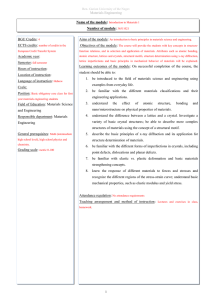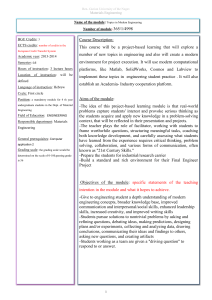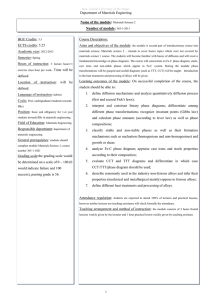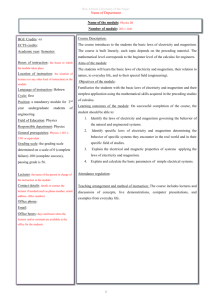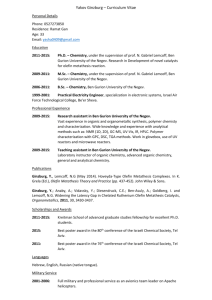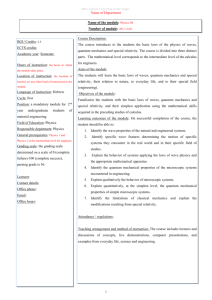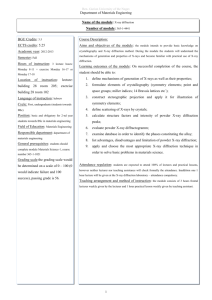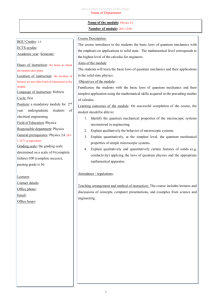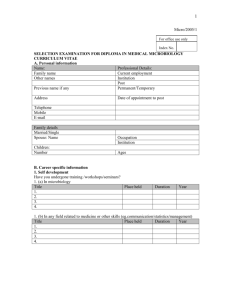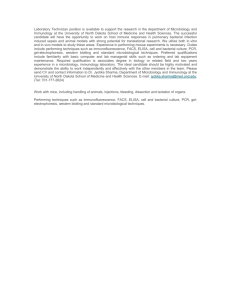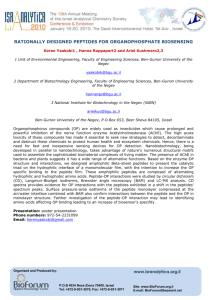ECTS Clinical Microbiology syllabus
advertisement
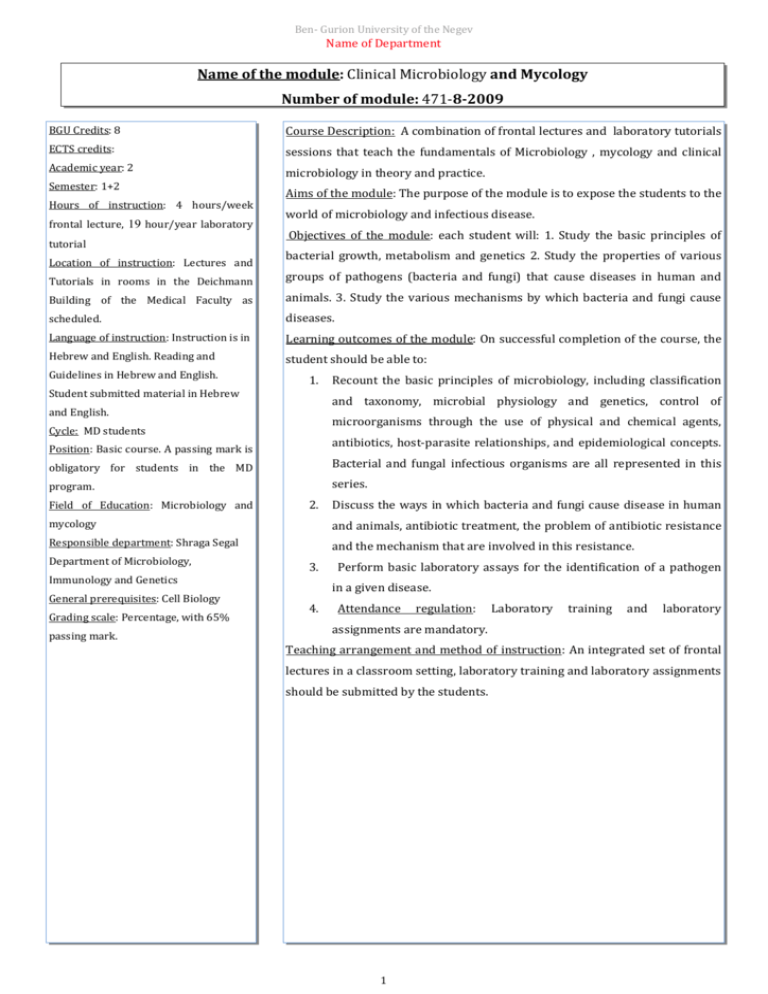
Ben- Gurion University of the Negev Name of Department Name of the module: Clinical Microbiology and Mycology Number of module: 471-8-2009 BGU Credits: 8 Course Description: A combination of frontal lectures and laboratory tutorials ECTS credits: sessions that teach the fundamentals of Microbiology , mycology and clinical Academic year: 2 microbiology in theory and practice. Semester: 1+2 Hours of instruction: 4 hours/week frontal lecture, 19 hour/year laboratory tutorial Location of instruction: Lectures and Aims of the module: The purpose of the module is to expose the students to the world of microbiology and infectious disease. Objectives of the module: each student will: 1. Study the basic principles of bacterial growth, metabolism and genetics 2. Study the properties of various Tutorials in rooms in the Deichmann groups of pathogens (bacteria and fungi) that cause diseases in human and Building of the Medical Faculty as animals. 3. Study the various mechanisms by which bacteria and fungi cause scheduled. diseases. Language of instruction: Instruction is in Learning outcomes of the module: On successful completion of the course, the Hebrew and English. Reading and student should be able to: Guidelines in Hebrew and English. 1. Student submitted material in Hebrew Recount the basic principles of microbiology, including classification and taxonomy, microbial physiology and genetics, control of and English. microorganisms through the use of physical and chemical agents, Cycle: MD students antibiotics, host-parasite relationships, and epidemiological concepts. Position: Basic course. A passing mark is obligatory for students in the MD Bacterial and fungal infectious organisms are all represented in this program. series. Field of Education: Microbiology and 2. Discuss the ways in which bacteria and fungi cause disease in human mycology and animals, antibiotic treatment, the problem of antibiotic resistance Responsible department: Shraga Segal and the mechanism that are involved in this resistance. Department of Microbiology, 3. Immunology and Genetics General prerequisites: Cell Biology Grading scale: Percentage, with 65% passing mark. Perform basic laboratory assays for the identification of a pathogen in a given disease. 4. Attendance regulation: Laboratory training and laboratory assignments are mandatory. Teaching arrangement and method of instruction: An integrated set of frontal lectures in a classroom setting, laboratory training and laboratory assignments should be submitted by the students. 1 Ben- Gurion University of the Negev Name of Department Lecturers and coordinators: Prof. Esther Assessment: Priel Lecturers: Prof. Y. Mizrachi-Nebenzhal, 1. Final exam, 80% Prof. P. Zagupsky, Dr. Y. Moran-Gilad 2. Lab. Exam + Lab. assignments 20% Lab. Coordinator: Prof. Y. MizrachiNebenzhal 100% Contact details: Priel: Office phone: (08) 6477254 Work and assignments: Students are briefed on the course work, including Email: priel@bgu.ac.il Office hours: On an ad hoc basis, laboratory assignments, at the beginning of the year. Sundays to Thursday, 9:00 am to 5:00 Time required for individual work: Reading, lab-related work, and material pm. review is estimated requiring 3 to 4 hours/week. Module evaluation: Organized yearly feedback from students at end of semester. Periodic review by academic committee. Confirmation: the syllabus was confirmed by the faculty academic advisory committee to be valid on 2012 Last update: 2013 2 Ben- Gurion University of the Negev Name of Department The time spent (hours) on each of the topics (frontal lectures only), in the order shown, is as follows: Teaching unit: Topics (hrs) Semester I 1. 2. Introduction- Bacterial taxonomy, Bacterial morphology and cell wall structure (2) Bacterial metabolism, growth and nutrition(2) 3. Bacterial genetics (2) 4. Antibacterial agents (2) 5. Antibiotic resistance (2) 6. Staphylococcus (4) 7. Meningococcus, gonococcus (2) 8. Haemophilus, Bordetella (2) 9. Molecular epidemiology (2) 10. Pneumococcus (2) 11. Streptococcus (4) 12. Listeria (2) 13. Mycology (8) 14. Infections in immunodeficiency patients Semester II 1. Enterobacteriacea, vibrionacea, campylobacter, helicobacter (6) 2. Spirochaetaceae (Borrelia, Leptospira) (2) 3. Non-fermentative gram (-) bacteria (2) 4. Mycoplasma (2) 5. Legionella (2) 6. Brucella (2) 7. Rickettsia (2) 8. Anerobic gram (+) bacilli (4) 9. Diagnostic methods in infectious diseases (4) 10. Host-parasite relationship (2) 11. Pathogen and bioterror (anthrax, tularemia) (2) 12. Chlamydia (2) 13. Mycobacterium (4) 14. Case reports discussion (4) Laboratory training: The laboratory program is constructed around two experimental challenges; 1. Methods for isolation of bacteria from clinical specimen 2. Methods for the identification of the infectious agent (Staphylococcus, streptococcus, enterobacteriacea, mycoplasma ). Reading: 1.Medical microbiology, Murray et al, fourth edition 2. Manual of Clinical Microbiology, Murray et al, Sixth edition * All learning material will be available to the students on the module's website (high-learn)/ library/ electronic documents available to BGU students. 3 Ben- Gurion University of the Negev Name of Department 4 Ben- Gurion University of the Negev Name of Department 5 Ben- Gurion University of the Negev Name of Department 6 Ben- Gurion University of the Negev Name of Department 7 Ben- Gurion University of the Negev Name of Department 8
